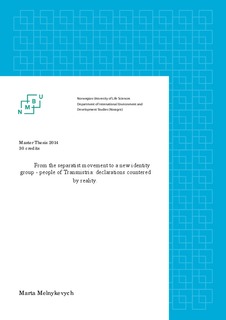| dc.description.abstract | This thesis assesses the achievements in nation-building in Moldova’s break-away region, the Pridniestrovian Moldovan Republic. Bearing in mind achievements in PMR’s state-building, it is assumed that people in Transnistria will willingly identify themselves with this de facto state. Citizens living within the de facto state borders with all elements of statehood should be able to develop strong patriotic ties towards their home country, and choose Transnistrian as their main identity, instead of their ethnic identities.
People of Transnistria, consisting of such three biggest ethnic groups like Russians, Ukrainians and Moldovans, constitute an example of a civic nation. Resemblance to some people and difference from the others constitutes a foundation of any national identity. The war of 1992 enhanced differences between Transnistrians and Moldovans. Simultaneously it prompted an establishment of a new Transnistrian identity. In addition, there were circumstances such as language, culture, historical background and geographical location that contributed to the creation of Transnistrian nation. The policies of PMR’s authorities aimed at creation of unique Transnistrian culture and identity are rather timid. They can not compete with strong messages and actions from the Russian Federation about similarities and common past of these two people. The Soviet history, myths of that time, and once shared common identity contribute to establishment of Transnistrian nation which accordingly is dependent on Russian culture and language. | nb_NO |
